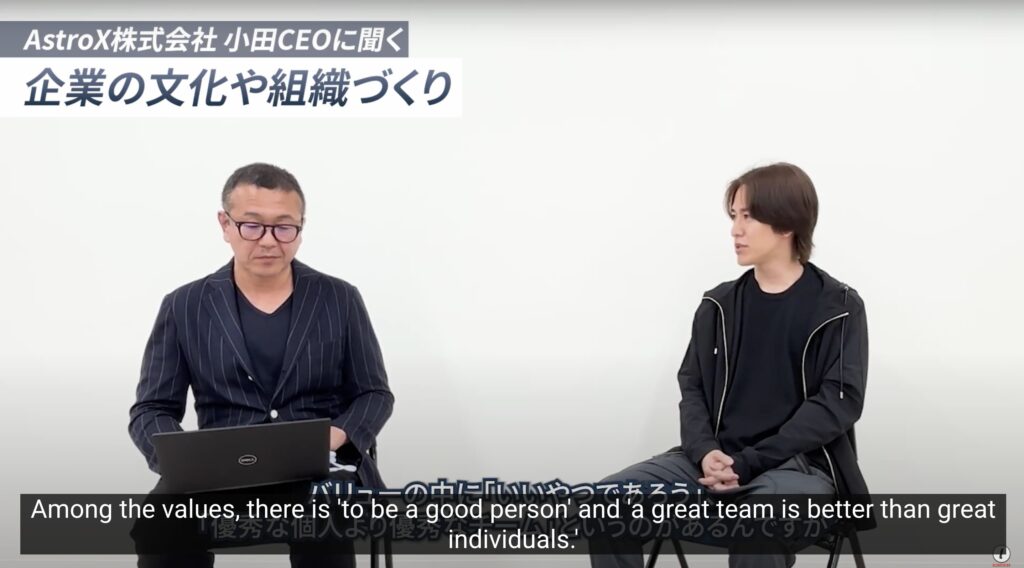AstroX, Inc. is a rising star in Japan’s space tech scene, known for its innovative “rockoon” launch method. In this interview, CEO Shobu Oda shares the company’s mission, the unique advantages of their technology, their connection to Fukushima’s regional revitalization, and their vision for the future of Japan’s space industry.
*English subtitles available
“Launching Rockets from Balloons?” Inside AstroX’s Radical Approach to Spaceflight
“We are developing rockets with the vision of Regaining “Japan as No.1” in space development.” Shobu Oda, CEO of AstroX says.
AstroX’s core innovation is the “rockoon”. A balloon carries the rocket to the stratosphere, where it is launched.
This method has three key advantages:
- Energy Efficiency: Traditional rockets consume significant energy fighting atmospheric resistance in the lower atmosphere. Rockoons bypass this by launching from high altitudes, reducing energy use and cost.
- Location Flexibility: Unlike traditional rockets requiring fixed spaceports, rockoons can launch from offshore vessels, avoiding congested air and sea routes. This opens the door to more frequent and accessible launches.
- Reduced Stress on Payloads: Launching from the stratosphere significantly reduces acoustic and vibrational impact, lowering costs and design requirements for satellite developers.
Why Rockoons Haven’t Been Used—Until Now
The rockoon concept isn’t new, but its practical application has long been delayed due to two main issues:
- Low Demand for Small Rockets: Historically, most satellites were large, requiring heavy-lift rockets. The shift to small satellites has only recently created demand for smaller, more flexible launch methods.
- Safety and Technical Barriers: Traditional rockets are explosive, and launching one via balloon posed significant safety risks. However, AstroX uses non-explosive hybrid rockets, minimizing danger even in the event of a malfunction.
With these challenges addressed, rockoons are finally becoming a viable option.
A Space Venture Rooted in Regional Revitalization
AstroX’s base in Minamisoma, Fukushima Prefecture, plays a key role in Japan’s post-disaster recovery initiative—the Fukushima Innovation Coast Framework. The company has worked closely with local authorities to conduct tests and build support.
“As a startup, we move fast,” says Oda. “The city helped us communicate with residents and even supported our operations. It’s truly a collaborative effort.”
Building a Values-Driven Team

AstroX’s culture is deeply influenced by Oda’s eclectic background—from musician to tech entrepreneur. The company is guided by six core values, which Oda emphasizes in hiring and daily operations.
“One of our values is ‘Be a good person.’ We believe long-term success depends on teamwork and mutual respect. We don’t just look at technical skills—we prioritize cultural fit.”
Monthly in-person meetings reinforce this shared vision, ensuring the team stays aligned with AstroX’s goals and culture.
Roadmap to 2030: Suborbital to Orbital and Beyond
AstroX’s development is structured into three phases:
- Suborbital Phase: The current stage, with rockoon launches targeting the edge of space.
- Orbital Phase (by 2028): Achieving full orbital capability with small rockets.
- Mass Production & Commercialization (2029–2030): Scaling operations and solving industry pain points with high-frequency launches.
Moving Fast Like a Tech Startup
Despite operating in the traditionally slow-moving aerospace industry, AstroX has moved rapidly since its founding in 2020.
“Speed is everything,” says Oda. “We’re okay with small mistakes if they help us reach the goal faster. I’m not an engineer—I focus on what needs to be done to reach our vision and choose the technology that fits, not the other way around.”
The Future of Space—And Japan’s Role
Oda believes we are in the “IT dawn” of the space industry. “Just like IT became essential in every sector, space will too,” he says.
AstroX sees its role as building the rocket infrastructure to support this transformation—not just launching satellites but becoming a platform for broader industrial collaboration in space.
“Our goal isn’t just to build rockets. We want to reignite Japan’s global leadership and give the next generation a reason to believe that Japan is cool again.”
Careers at AstroX: Opportunities for Engineers and Business Talent
AstroX is hiring across both engineering and business roles. With a small, agile team of around 30 people, everyone’s work has a direct impact.
“You don’t need space experience,” says Oda. “Many of our engineers came from other industries. Space combines many disciplines—radio, embedded systems, mechanics—so diverse backgrounds are welcome.”
Business roles range from PR to lobbying, government relations, and sponsorship development. “We’re building something that has never existed in Japan,” says Oda. “And we need people who want to be part of that journey.”
✉️ Interested in joining AstroX?
Click here to inquire about job opportunities: https://talisman-corporation.com/en/contact-personal/
Please include “AstroX article read” in the message field.
This article is based on the following video conversation we recorded and has been revised and expanded for clarity and depth.
🎥 Interview with Shobu Oda, CEO of AstroX Corporation, a Japanese Space Venture Company
If you found this interesting, don’t forget to subscribe to our YouTube channel for more career advice, insider tips, and job market insights—especially if you’re navigating a tech career in Japan!
🌟 Interested in working in Japan’s tech industry?
Explore job opportunities on our IT Job Board for Foreign Engineers














